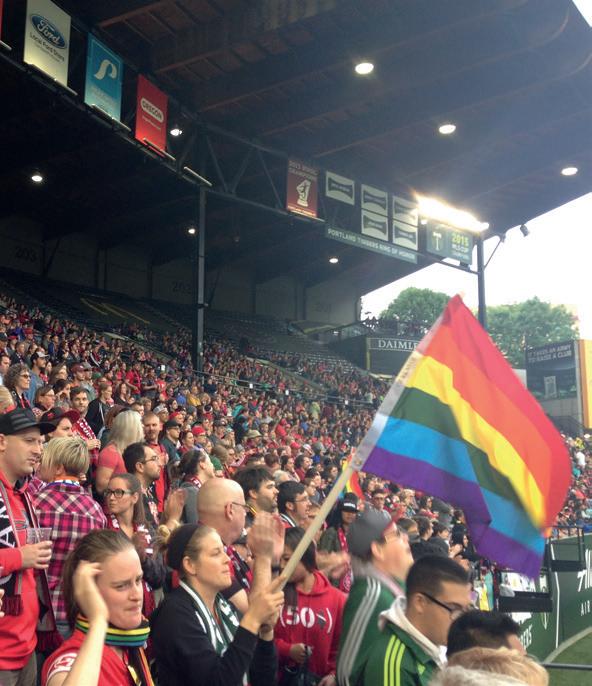
3 minute read
LGBTQ+ contribution to sport
by Exeposé
Joseph Terry assesses the status of the LGBTQ+ community across the sporting world
WHEN I began research for this article, my awareness of LGBTQ+ sportspeople and their impacts (and subsequently the challenges they may face) was small. However, after research for this article, I’ve found that I underestimated the impact of LGBTQ+ sportspeople to me personally. Furthermore, these sportspeople are not strictly defined by their sexuality.
Advertisement
I started off by researching LGBTQ+ involvement within motorsport, the sport I follow the closest. The pairing of Abbie Eaton and Jess Hawkins sprung to mind — both competitors within the female-only W Series category, alongside experience within touring cars and GT categories. Eaton, herself a Driver Ambassador for Racing Pride that promotes LGBTQ+ inclusivity within technological and commercial partners in motorsport, is perhaps best known for her involvement with the The Grand Tour as the official test driver over the early seasons of the show. However, she also holds race starts within various British GT championships and high-level domestic series, and in 2017 became the first female driver to win a class category in a Blancpain GT Series race.
Hawkins is a vice-champion in the eclectic Mini Challenge UK series as well as a podium finisher in W Series, as well as making her debut in the British Touring Car Championship. Being a driver ambassador for the Aston Martin F1 team and a stunt driver involved with the production of the most recent Bond film gave some insight into battling your partner on the track, showing the racing driver mentality: “It’s nice to go through the ride with each other, but we’ve said we’ll leave that at the track, and as far as we’re both concerned our career comes first.” Furthermore, my research then led me to a driver I already admired and respected, but had no idea of her inclusion within the LGBTQ+ community. Lella Lombardi is regarded by many racing historians as one of the seminal female racing drivers that introduced female involvement within premier motorsport — starting 12 F1 races and entering 17 from 1974-76, scoring half a point in F1. She was the first female driver to qualify for a Grand Prix for 17 years at the 1975 South African GP at Kyalami, and performances driving for March and later BRM included a seventh-place finish at the perilous Nürburgring Nordschleife, the forested circuit nicknamed the 'Green
Hell' by Sir Jackie Stewart. A career in sports cars at frighteningly quick circuits such as Enna Pergusa and a chicane-less Circuit de la Sarthe at Le Mans followed.
I respect Lombardi as a trailblazer to encourage female inclusion and queer inclusion within F1 and elite motorsport, but more importantly I respect Lombardi for her bravery for competing in the period when drivers would tragically lose at least three or four friends every year. Some of my greatest sporting heroes such as Niki Lauda and Sir Jackie Stewart are my heroes as they bet on their skill and intuition to save their lives every corner of every lap — and this heroism is something I am constantly in awe of. Lella Lombardi’s heroism is deserving of greater status, and I hope that she will one day get the level of adulation afforded to Michele Mouton as a female trailblazer.
Greater inclusion of openly queer figures over recent years shows that cultures within sport are changing. Josh Cavallo and Jake Daniels in male pro- fessional football, Sam Kerr and Marta in women’s professional football, Jack Dunne and Nick McCarthy in rugby union, Keegan Hirst in rugby league, and Nat and Katherine Sciver-Brunt in cricket. There are more role models than ever before, but barriers remain — anonymous letters from a Premier League footballer in 2020 and an Eredivisie player in 2021 show that fears remain for closeted queer athletes. More poignantly, this May will mark the 25th anniversary of Justin Fashanu’s tragic death. Fashanu’s niece and founder of the Justin Fashanu Foundation, Amal Fashanu, reflected upon progress: “Though I wholeheartedly believe that a gay footballer would be overwhelmed with support today… this admission would forever define them, whether they were comfortable with this or not.” With more role models than ever before, hopefully LGBTQ+ sportspeople will be defined by their sporting achievements in the future, not by their sexuality alone.









